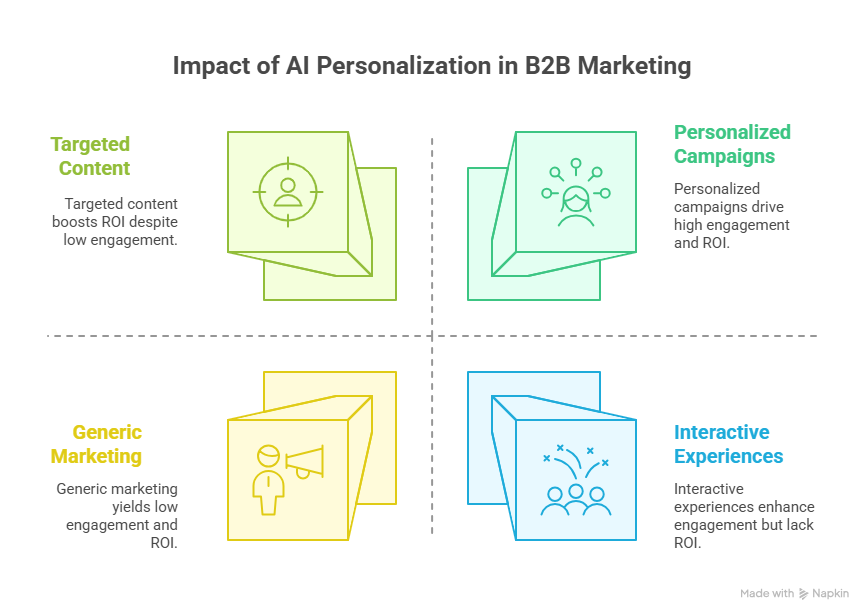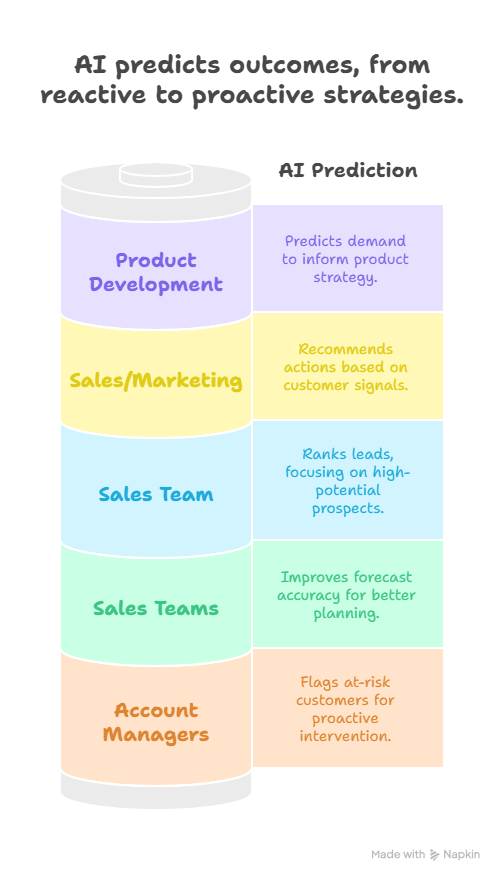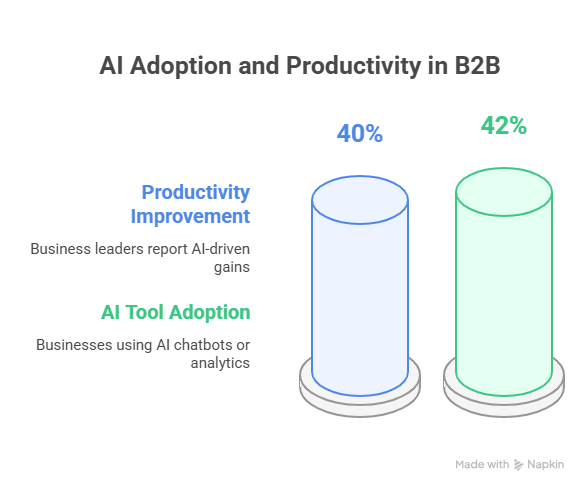Artificial Intelligence (AI) is no longer just a buzzword in the B2B world – it’s a game-changer. In 2025, AI has become an essential part of B2B marketing and sales strategies, helping companies do more with less. In fact, 89% of leading businesses are already investing in AI to drive revenue growth. From automating routine tasks to predicting customer behavior, AI is empowering teams to work smarter and focus on what really matters: building relationships and closing deals. This post explores three key areas where AI is transforming B2B marketing and sales – personalization, predictive analytics, and process automation – and offers practical guidance on how your business can adopt these AI solutions to stay ahead of the competition.
AI-Powered Personalization in B2B Customer Experiences
In B2B marketing, delivering a personalized customer experience is no longer optional – it’s expected. Today’s B2B buyers crave the same level of personalization they experience as consumers. According to Accenture, 73% of B2B buyers now want a personalized, B2C-like experience. AI makes this kind of hyper-personalization at scale possible. By analyzing customer data (from past purchases, website behavior, industry, etc.), AI can help marketers tailor every interaction to the customer’s unique needs and context.
How AI enables personalization in B2B: AI-driven tools can segment audiences into very specific groups and even down to individual accounts, then customize content and offers for each one. For example, AI can analyze a prospect’s browsing history and business profile to recommend the most relevant case studies or product offerings. Email marketing platforms with AI might send dynamic content – where the email content or subject line adapts for each recipient based on their behavior or firmographics. Similarly, AI-powered Account-Based Marketing (ABM) platforms identify intent signals and help deliver the right message at the right time to each target account.
The impact of AI personalization is significant:
- Higher Engagement: Tailoring content and outreach to each prospect cuts through information overload. Companies report that AI-driven personalization has improved customer engagement and service quality – in one survey 62% of companies said AI significantly improved customer service through enhanced personalization.
- Better Conversion Rates: When a prospect sees content or offers precisely aligned to their business pain points, they’re far more likely to convert. Personalized campaigns result in higher response and conversion rates than one-size-fits-all marketing.
- Improved Customer Experience & Loyalty: AI can ensure that every touchpoint (website, emails, chat, sales call) is relevant and helpful to the customer. This seamless, consumer-like experience in B2B builds trust and loyalty over time. Buyers feel understood, not sold to, which strengthens relationships.
- Greater Marketing ROI: Personalization focuses your resources where they have the most impact. By serving the right content to the right people, marketers avoid wasting spend on uninterested audiences. The result is often a better return on investment and shorter sales cycles.

AI-powered personalization can be seen in tools like intelligent website content management (showing different homepage content based on visitor’s industry or account), personalized product recommendation engines for B2B e-commerce, and sales enablement tools that suggest tailor-made pitch decks for each client. By 2025, leveraging AI for personalization has become crucial for B2B success, as businesses that deliver relevant, personalized experiences will stand out from competitors.
Predicting Customer Behavior with AI (Predictive Analytics in B2B)
Wouldn’t it be great to know which leads are most likely to turn into customers, or which existing clients might be ready for an upsell, before it happens? AI makes this possible through predictive analytics. By sifting through historical data and real-time signals, AI can forecast customer behavior and buying intent with uncanny accuracy.
AI-driven predictive analytics uses machine learning models to analyze thousands of data points about prospects and customers – from their past engagement and purchase history to firmographic data and even external market trends. By finding patterns in this data, AI can predict outcomes such as:
- Lead Scoring & Conversion Likelihood: AI models can rank your leads by how likely they are to convert, so your sales team can focus on high-potential prospects first. These tools identify high-intent leads and forecast customer behavior, giving sales a huge advantage. In practice, this means less time wasted on cold leads and more wins from hot ones. Businesses using AI for lead scoring report shorter sales cycles as a result.
- Churn Prediction: For account managers, AI can analyze usage patterns and engagement to flag customers who might be at risk of churn (e.g. declining product usage or support tickets with negative sentiment). This early warning lets your team intervene proactively to improve satisfaction or offer a tailored solution to retain the client.
- Sales Forecasting: AI is improving the accuracy of sales forecasts by factoring in far more variables than a human could handle. It can account for seasonal trends, economic indicators, pipeline behavior, and more to predict next quarter’s sales. The result is more reliable revenue forecasts and better planning.
- Next-Best Action Recommendations: Predictive systems can suggest what a salesperson or marketer should do next for a particular account. For example, an AI tool might identify that Prospect X is showing buying signals (like frequent visits to your pricing page) and recommend immediately sending a tailored discount offer. Or it might tell you which content piece will most likely nurture a particular lead based on others with similar profiles – almost like a “Netflix-style” recommendation engine for B2B buyers.
- Market Trend Prediction: Beyond individual customer behavior, AI can analyze broad datasets (social media trends, industry news, etc.) to predict where demand is heading. This can inform product development and marketing strategy (e.g. predicting which product features or solutions a market segment will be looking for next).

By leveraging AI predictions, B2B companies can anticipate customer needs and act at the perfect moment. For instance, if the AI model predicts a certain lead has an 85% chance of converting this month, the sales team can prioritize that account and tailor a proposal immediately. This data-driven foresight translates into tangible benefits – higher conversion rates, more timely upsells, and avoiding lost deals due to slow reaction. As one expert noted, using AI and machine learning to forecast buyer behavior and adapt strategies in real time is becoming a critical skill for marketers in 2025.
The bottom line: predictive analytics takes the guesswork out of B2B marketing and sales. Instead of relying on hunches or static lead qualification criteria, teams armed with AI insights can focus their energy where it counts. This not only boosts efficiency but also improves the customer experience – prospects get approached with relevant offers right when they’re most receptive. It’s a win-win for both businesses and their customers.
Automating Marketing and Sales Processes with AI
One of AI’s most immediate impacts in B2B organizations has been the automation of time-consuming marketing and sales tasks. In the past, sales reps and marketers spent countless hours on routine activities: logging data into the CRM, writing and sending follow-up emails, scheduling meetings, qualifying cold inquiries, and so on. In 2025, much of this busywork can be offloaded to AI, allowing human teams to <strong”>focus on strategy, creativity, and closing deals.
Key areas where AI-driven automation excels:
- Lead Qualification and CRM Updates: Instead of manually sorting through lead lists, AI systems can automatically analyze behavioral signals (website visits, email opens, content downloads) and score or prioritize leads for you. When a new lead comes in, an AI-powered CRM can instantly assess if it matches your ideal customer profile and engage or route it accordingly. These systems also auto-log interactions – emails, calls, meetings – so reps don’t have to spend time on data entry. No more opportunities slipping through cracks because someone forgot to update a spreadsheet; the AI keeps track in real time.
- Email and Campaign Automation: AI makes marketing campaigns far more efficient. It can determine the best time of day to send emails to each contact for higher open rates, tweak email subject lines and content for different segments, and even personalize send-frequency based on engagement levels. Some advanced platforms monitor responses and can adjust your outreach cadence on the fly – pausing emails to contacts who haven’t engaged or scheduling a follow-up at exactly the right interval. The result is higher response rates and less “email fatigue” among prospects.
- AI Chatbots for Sales & Support: AI-powered chatbots and virtual assistants are now common on B2B websites and messaging channels. These bots can handle initial customer inquiries 24/7, answer frequently asked questions, and guide visitors through basic product info or troubleshooting. In a sales context, chatbots can qualify prospects (by asking questions about needs or company size), provide resources like demos or case studies, and even schedule meetings with human reps when a lead is hot – all without human intervention. By automating these early touchpoints, companies respond to every inquiry instantly, which boosts customer satisfaction and captures more leads without adding headcount.
- Routine Sales Tasks & Insights: AI personal assistants for sales can automate tasks like updating pipeline statuses, setting reminders for follow-ups, or even drafting proposal documents based on templates. They can also analyze sales call transcripts (using natural language processing) to extract actionable insights – e.g. alert a manager if a competitor was mentioned frequently in sales calls this week, or if a customer’s sentiment turned negative. This kind of automation ensures no detail is missed and reps can act quickly on opportunities or issues.
- Analytics and Reporting: Generating reports and pulling insights used to eat up a lot of time. AI can now auto-generate many reports – from marketing campaign performance summaries to sales forecasts – in a fraction of the time. It can highlight anomalies or trends in the data that you should pay attention to, without you manually crunching numbers.
All these automations translate into real efficiency gains. Teams using AI report significant productivity improvements – over 40% of business leaders say they have increased productivity through AI automation. Sales cycles speed up when reps aren’t bogged down in admin work. Marketing campaigns become more effective when optimized continuously by AI. And importantly, automation ensures consistency and best practices are followed every time (for example, every lead always gets a follow-up email, because the AI never forgets to send it).
Perhaps that’s why adoption of AI in daily operations has surged. AI tools are becoming commonplace in B2B tech stacks – for instance, around 42% of businesses are already using AI-driven chatbots or predictive analytics tools as of 2025. This number is only expected to grow as AI proves its value in reducing manual workload and improving results. For any B2B company looking to scale efficiently, AI-powered automation and AI marketing tools have moved from “nice-to-have” to “must-have” in the toolbox of modern sales and marketing teams.

How to Adopt AI in B2B Marketing and Sales – Practical Steps
Implementing AI solutions can seem daunting, but with the right approach, even businesses new to AI can start reaping the benefits quickly. Here is a practical step-by-step guide to help integrate AI into your B2B marketing and sales strategy:
- Educate and Empower Your Team: Begin by building AI awareness and skills within your organization. Train your marketing and sales teams on the basics of AI and what it can do. Encourage workshops or demos of AI tools so employees feel comfortable working alongside AI. When your team understands the value of AI (and how it won’t replace them but assist them), they’ll be more eager to embrace it. Creating a culture open to innovation is key – celebrate small AI wins and make continuous learning part of your company DNA.
- <strong”>Audit and Prepare Your Data: AI runs on data. Evaluate the customer data you have – is it comprehensive, clean, and accessible? Break down data silos between your CRM, marketing automation platform, customer support system, etc., so that AI tools can draw from a rich, unified data set. Investing in data quality (cleaning up duplicates, standardizing fields, ensuring data is up-to-date) will pay off massively, since clean data is the foundation of effective AI insights. If your data is lacking, you might start collecting more (for example, tracking website behavior or enriching records with third-party data) to feed your AI models.
- Start Small with a Pilot Project: Rather than trying to overhaul everything at once, pick one high-impact area to pilot an AI solution. For example, you might start with an AI-powered lead scoring tool in sales, or an AI chatbot on your website, or AI to automate your email marketing segmentation. Choose a use case that addresses a known pain point (e.g. too many unqualified leads, slow response time to inquiries, etc.) and set clear success metrics (e.g. reduce lead response time by 50%, increase email CTR by 20%). Implement the AI solution on a small scale and monitor the results. Starting small allows you to prove the ROI of AI to stakeholders and learn lessons before wider rollout.
- Choose the Right Tools and Partners: The AI marketplace in 2025 is rich with options – from large platforms with AI features (Salesforce Einstein, HubSpot, Marketo, etc.) to specialized AI startups offering innovative tools for specific tasks. Research and evaluate AI marketing tools that fit your needs and budget. Look for solutions with proven case studies in B2B, user-friendly interfaces, and strong customer support. Don’t hesitate to leverage external expertise: consider partnering with consultants or tech providers (like AI solution experts at TTMS) who can guide your implementation and tailor solutions to your business. The goal is to equip your team with tools that genuinely make their jobs easier, so involve the end-users in the selection process and opt for trials or demos to ensure a good fit.
- Measure, Iterate, and Scale Up: Once your pilot is running, track its performance closely. Measure the outcomes against the goals you set (e.g. time saved, conversion lift, revenue impact). AI projects should be treated like any other investment – use data to prove their value. Gather feedback from your team on what’s working or any challenges. Then, iterate: tweak the AI model’s parameters if needed, improve training data, or provide additional training to the team on using the tool. When you’re satisfied with the results, make a plan to scale the AI solution more broadly. Also look for adjacent areas that could benefit from AI. Maybe your success with an AI chatbot for support means you can expand it to sales inquiries, or the predictive lead scoring can be extended to predicting customer upsell opportunities. Step by step, integrate AI into more facets of your B2B marketing and sales strategy. Finally, establish regular reviews of all AI systems to ensure they continue to perform well and align with your business goals.
By following these steps, adopting AI becomes a manageable journey rather than a leap into the unknown. A few additional tips: always maintain ethical standards and transparency with AI (for example, ensure use of customer data complies with privacy laws, and consider informing customers when they’re interacting with a bot). And remember, AI is a tool to augment your team, not replace the human touch – the best results come when AI’s speed and data-crunching are combined with human creativity, empathy, and expertise. Businesses that approach AI adoption in this balanced way will find it to be a powerful ally in driving growth.
From Strategy to Success: Make AI Work for You
Artificial intelligence is truly transforming B2B marketing and sales in 2025 — from hyper-personalized customer experiences to accurate predictions of buyer behavior and seamless automation of workflows. Companies that embrace AI today are gaining a clear competitive edge through greater efficiency, improved engagement, and smarter, data-driven strategies. AI is no longer just an enhancement — it’s becoming the foundation of how modern B2B organizations attract, convert, and retain customers.
At TTMS, we help businesses unlock the full potential of AI across the entire customer journey. From strategy to implementation, our AI solutions are tailored to your industry, your goals, and your team.

Ready to take the next step?
👉 Discover how our AI services can transform your marketing and sales: https://ttms.com/ai-solutions-for-business/
Let’s build your competitive advantage with AI — together.
How soon can we expect results after implementing AI in marketing and sales?
Initial benefits such as improved efficiency and enhanced customer segmentation typically become noticeable within a few weeks of starting a pilot project. More significant outcomes, like accurate customer behavior predictions and increased conversion rates, usually become clear after a few months, as AI models gather more data and become refined.
Does adopting AI require significant changes to our current processes?
Not necessarily—AI solutions often integrate smoothly with existing tools like CRMs or marketing automation platforms, minimizing disruption. However, fully leveraging AI’s potential might involve gradual adjustments and optimizations to your processes to maximize effectiveness.
Can AI fully replace human roles in B2B sales?
No, AI acts primarily as a supportive tool, automating routine tasks and providing valuable insights. Human capabilities such as empathy, creativity, and relationship-building remain essential. AI enables sales teams to focus more effectively on strategic and higher-value activities.
What skills should our team develop to effectively collaborate with AI?
Your team should have basic knowledge about how AI works and its benefits, along with the ability to interpret analytics results. It’s also important to develop skills related to data management and maintain openness to ongoing learning and adapting to new technologies.
Is implementing AI expensive for mid-sized B2B companies?
AI implementation costs have become increasingly affordable thanks to cloud-based solutions and scalable AI tools tailored to different budgets. Even mid-sized companies can start with modest projects, expanding gradually while controlling costs and clearly evaluating the return on investment.